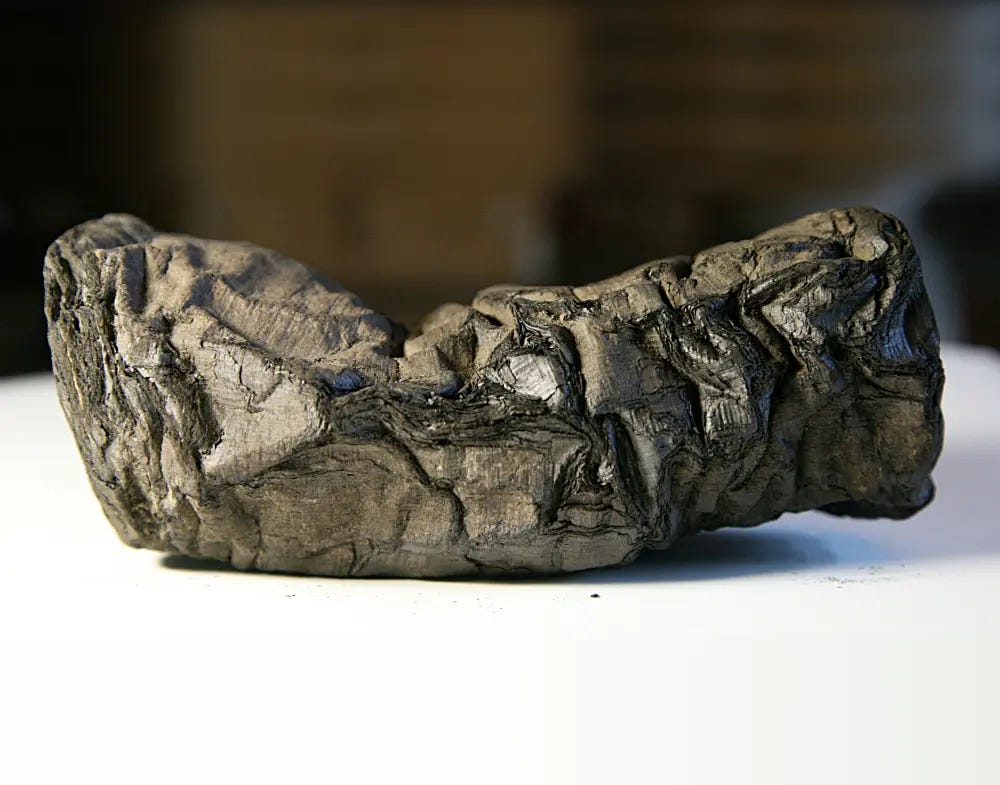This is the sixth, final part of the essay “Putin’s Genocidal Quest for Symbolic Immortality”. Previous parts: (1) Introduction, (2) “Moscow is silent”, (3) His-story of Ukraine, (4) “A fascist coup!”, (5) The architecture of a crime.
In 79 CE, the eruption of Mount Vesuvius annihilated several Roman settlements, most famously Pompeii and Herculaneum. In the 18th century, excavations at Herculaneum revealed the Villa of the Papyri, a treasure trove containing the largest collection of ancient texts to survive into the modern era, entombed beneath layers of ash and pumice. Hundreds of scrolls were unearthed – miraculously preserved yet carbonised, their fragile forms rendered unreadable, impossible even to unroll without inflicting fatal damage.
In 2023, computer scientist Brent Seales inaugurated the Vesuvius Challenge, an international contest aiming to recover the lost words of the Herculaneum scrolls.1 What was long deemed impossible has been made attainable by the strides of modern technology: today, scholars can peer inside the scrolls and read their contents without unrolling them.
The project unites minds across the realms of computer science, engineering, classical studies, papyrology, physics, and mathematics. It is a testament to the collective brilliance of humankind – a labour of hope and imagination, seeking to restore to humanity hundreds, perhaps thousands, of forgotten works of classical literature and philosophy.

The Vesuvius Challenge is not the first attempt to harness advanced techniques in service of this cause. However, it has proven the most successful effort so far, with just $1,500,000 awarded by 2025 – a modest price for revealing the first legible letters and titles from the Herculaneum scrolls, developing faster segmentation and ink detection methods, and creating open-source tools to advance the virtual unrolling and reading of ancient papyri.
The project is also a kind of time machine: its participants journey across the centuries, defying the wrath of Vesuvius to reclaim what its fires once wrested away, seemingly forever. In doing so, the project aspires to realise an alternative history – one in which the eruption of 79 CE had not consigned hundreds of ancient texts to oblivion.
It is in contemplating these awe-inspiring efforts devoted to the restoration of our lost ancient heritage that I feel a particular disgust toward the senseless devastation of valuable resources, and of invaluable human lives and futures, wrought by Russia’s eliminationist war against Ukraine.
And it is in observing the immense collective endeavour of Russian economists, propagandists, engineers, IT specialists, political technologists, educators, industrialists, infrastructure experts, and many others – all tirelessly working to fuel the relentless machine of death and destruction – that I cannot help but wonder:
What if, instead of extinguishing hope and future, instead of reversing life into death, their ingenuity – so capable of creating, persuading, and inspiring – were harnessed to reverse loss into renewal, and to craft a horizon shaped by dignity and human possibility?
An impressionable teenage Putin – a fan of historical reconstructions featuring Soviet operatives battling Western threats to Russia – marvelled, in his own words, at “how one man’s efforts could achieve what whole armies could not. One spy could decide the fate of thousands of people”.2 For Putin, his immersion in Soviet thrillers and identification with heroes such as Stierlitz became a rite of passage from adolescence into the adulthood in which he would become a KGB officer.
His years in the KGB only deepened his hostility toward the West, and toward any stirrings of popular sovereignty or national liberation – all of which, in defiance of Soviet repressive rule, he came to view through a securitised lens as deliberate assaults orchestrated by the West against Russia.
The trauma of Dresden in 1989 and the collapse of Soviet power appear to have taken Putin’s anti-Western prejudice to a new level, shattering the psychological armour that had shielded him from mortal dread with the promise of survival through the permanence of the Soviet state. As he grew more powerful as Russia’s president – and edged closer to death as a physical being – he must have increasingly seen the West’s victory in the Cold War, along with the existence of the Ukrainian national project, as historical ruptures that could be undone through war, reclaiming the promise of his symbolic immortality.
It took powerful networks of pan-Russian ultranationalism, historical revisionism, and dehumanising political technology to help Putin decide “the fate of thousands of people” and to forge the Russian war effort – directed openly against the Ukrainian nation and, indirectly, against the West. And it took millions of Russian soldiers and civilian auxiliaries to sustain it, turning ambition into brutal reality.
The war has already proved catastrophic not only for Ukraine, but for Russia as well. And in this, the true nature of Putin’s quest for immortality stands revealed: in the end, he has not achieved Russia’s greatness, but only ruin – the destruction of countless Ukrainian, Russian, and other lives, sacrificed like the retinue of a dying pharaoh to accompany him toward his inevitable final death.
Vesuvius Challenge, https://scrollprize.org.
Ot pervogo litsa. Razgovory s Vladimirom Putinym (Moscow: Vagrius, 2000), p. 24.


